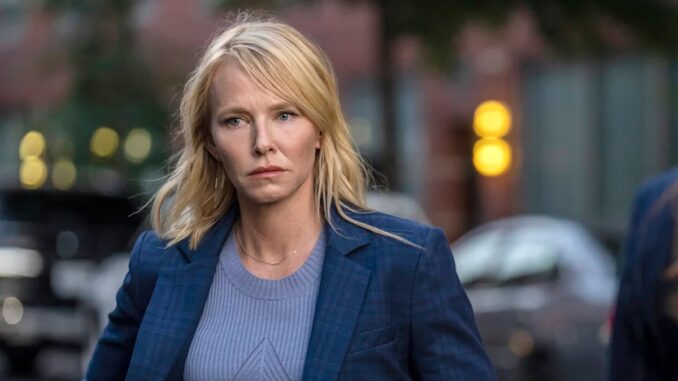
The Fading Spotlight: The Real Reason Kelli Giddish Left Law and Order SVU Revealed
The landscape of long-running television dramas is a peculiar ecosystem, one where beloved characters can become as deeply ingrained in the public consciousness as family members. So, when the news broke that Kelli Giddish, the tenacious and deeply flawed Detective Amanda Rollins, would be departing Law & Order: SVU after twelve seasons, it wasn't just a plot twist; it was a seismic shockwave that rippled through the show's devoted fanbase. A collective gasp echoed across social media, followed by a torrent of speculation, grief, and, inevitably, demands for the "real reason." While the official statements offered polite platitudes about character arcs reaching their natural conclusion or an actor's desire to explore new opportunities, the truth, as it so often is in the cutthroat world of network television, is less about artistic epiphany and more about the relentless, unforgiving grind of the machine.
For over a decade, Amanda Rollins evolved from a morally ambiguous transfer detective, haunted by personal demons and a gambling addiction, into a grounded, compassionate, and essential member of the SVU squad. We witnessed her battles with addiction, her fraught family dynamics, the birth of her children, and her eventual blossoming into a stable, respected, and even beloved figure, culminating in her marriage to Carisi. Her journey was a testament to Giddish's nuanced portrayal, a canvas painted with vulnerability and strength. This deep investment from viewers made her sudden exit feel less like a narrative choice and more like an abrupt amputation.
The immediate theories that swirled online were varied, each born from a place of attachment and suspicion. Was it ageism, a whispers of the industry’s pervasive youth bias targeting a woman in her forties? Was it salary disputes, a cold calculation of dwindling budgets and the rising cost of veteran talent? Did the show's matriarch, Mariska Hargitay, somehow play a role in orchestrating a shake-up? The showrunners and Giddish herself issued statements designed to quell the storm, but the vagueness only fueled the inferno of speculation. "It was time," Giddish posted on Instagram, a phrase as unsatisfying as it was ubiquitous in such situations. But for a show entering its twenty-fourth season, "time" often equates to something far more pragmatic than poetic.
The real reason, when peeled back layer by layer, is not a singular, dramatic conspiracy but rather a confluence of the unyielding realities of long-term television production. Firstly, there is the financial imperative. As a show ages, its stars become more expensive. Salaries escalate year after year, and for a network like NBC, even a cash cow like SVU eventually comes under intense scrutiny from the invisible hand of the bean counters. Trimming a veteran actor, even a popular one, can free up significant budget for new talent, new sets, or simply to increase profit margins. It's a harsh but inescapable truth that in the world of entertainment, talent is not immune to the cold logic of a spreadsheet.
Secondly, there's the creative stagnation paradox. For a show to survive for over two decades, it needs to constantly evolve, or at least appear to. While Rollins’ character arc was rich and fulfilling, the writers might have felt they had explored every major facet of her journey. Once a character finds stability, redemption, and domestic bliss, the dramatic tension that fuels episodic television can wane. Introducing new characters provides fresh perspectives, new conflicts, and new relationship dynamics that can revitalize a long-running narrative. It’s a perpetual quest for new blood to keep the narrative arteries from hardening, a theatrical equivalent of a corporate restructuring where the veteran employees are "phased out" to make way for the next generation.
Thirdly, and perhaps most subtly, there's the gravity well of the lead. SVU is, and always has been, Mariska Hargitay’s show. As Olivia Benson, she is the immovable core, the sun around which all other planets orbit. While other characters are vital, their purpose, in a sense, is to support Benson’s narrative and the overall mission of the unit. When decisions are made about cast changes, they often revolve around how best to serve Benson's story and the show's longevity. This isn't to say Hargitay personally "fired" Giddish, but rather that in a show so deeply identified with one actor, the supporting cast, no matter how beloved, inherently exists within a more transient space.
Ultimately, the "real reason" for Kelli Giddish's departure from Law & Order: SVU is not a single, sensational revelation, but a quiet, pragmatic truth about an industry driven by numbers as much as by narrative. It is the bittersweet reality that even the most cherished fictional characters are, at their core, temporary constructs within a complex, ever-evolving business model. Her exit serves as a poignant reminder that in the grand symphony of network television, even the most resonant notes eventually fade, making way for the next melody, leaving behind a profound echo in the hearts of those who listened so intently. For the fans, it was a loss of a friend; for the show, it was, simply, the cost of doing business.
